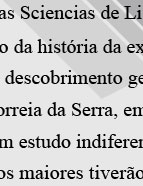

................................
Additionally, Joaquim de Carvalho (1892–1958), better known as a cultural historian, is also notable for his collaboration in the História de Portugal of Damião Peres (1928–35) and in the História do Regímen Republicano em Portugal [History of the Republican Regime in Portugal] (1930–1932) (dir. by Luís de Montalvor), where the political perspective was maintained.
Traditional political history continued under siege beyond the pressures of the "Annales". The structuralist current, also of French origin, further deepened its crisis. The compromise between structuralism and history originated in the early 1970s. The birth of structural history was based on several currents: one inspired by the constantly cited Fernand Braudel, who sought to study the evolution of human society in the long term; another inspired by Michel Foucault (1926–1984), who sought to conceptualise the structures and processes of the shift, giving rise to the notion of discontinuity; yet another of pure structuralist inspiration, more geared towards the analysis of closed corpora (myths, rituals, texts) based on the elaboration of abstract models by authors such as Claude Lévi-Strauss (1908–2009) or Jacques Lacan (1901–1981). This current asserted that linear and continuous history made no sense as it proceeds in leaps and mutations, while also denouncing the privileged status of history in Western thought. A fourth current was based on historical anthropology, seeking to dominate the field ranging from material culture to symbolic systems, with Emmanuel Le Roy Ladurie (1929) as its main cultivator.
The outcome of the structuralist methods—whether linguistic, semiotic, or psychoanalytic—geared structural history towards fields such as culture, mentalities, historical anthropology and psychoanalytic history, which are notably distant from the political realm. According to this paradigm, only the structural is deemed scientific, thus placing structure at the opposite end of the spectrum from the "event." The political was viewed as the antithesis of science. In the structuralist view of history, the political, singular events, individual facts, and the biographical, in the realm of literary studies, were deemed unnecessary.
